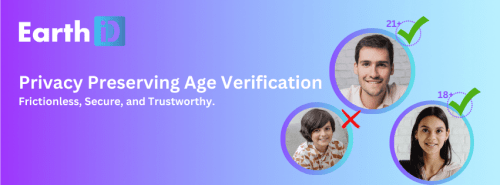
Age Verification Redefined: Privacy-Centric Approach
In today’s digital age, age verification has become increasingly crucial, particularly with the implementation of new laws and regulations in various jurisdictions. Regulations now require online operators to conduct age verification before consumers are allowed to access or purchase age-restricted or ‘harmful’ content. Both the UK and the US have recently reassessed their age verification laws, sparking discussions on privacy and security.
What is age verification?
Age verification is the process of confirming that a person is actually as old as they claim to be. This procedure is crucial for safeguarding young individuals from accessing products restricted by age prematurely. Historically, age verification was primarily employed to regulate the legal sale of items like alcohol and tobacco. Yet, as consumers of all ages increasingly interact with brands and content on the internet, age verification systems are evolving to comply with laws concerning digital age verification.
Which industries and organizations require age verification?
Sectors such as gaming and gambling, dating and adult entertainment, retail, healthcare and social media are mandated by law in many regions to perform essential age verification checks.
To adhere to legislative and regulatory demands globally, these industries must validate the ages and birth dates of their customers using specialized age and date of birth verification tools and solutions.
Age verification is particularly crucial in the gaming and gambling sectors to confirm the identity of the person and safeguard vulnerable individuals.
In the retail sector, age and date of birth verification processes are used to ensure that an individual meets the legal age requirements for purchasing restricted items like alcohol, tobacco, knives, and corrosive substances
Organizations that distribute adult content are required to implement robust measures to verify that individuals meet the minimum age requirement for accessing such content, typically by confirming the customer’s age or date of birth. This is vital for protecting both the consumer and the business, while ensuring compliance with regulations.
Healthcare organizations, particularly those offering telemedicine or online prescription services, need to verify the age of patients to comply with legal requirements and ensure appropriate medical care is provided.
Finally, social media platforms and online communities often employ age verification measures to create safe environments for younger users and comply with child protection laws such as the Children's Online Privacy Protection Act (COPPA).
Recent Developments in Age Verification Laws
In the UK, the Information Commissioner’s Office (ICO) updated its guidelines under the Children’s Code, focusing on protecting children’s biometric data. The US has also introduced new laws in states like New York and Utah, though these have faced criticism over privacy concerns and effectiveness. The Federal Trade Commission (FTC) has amended the Children’s Online Privacy Protection Act (COPPA) to better address the handling of children’s data, including biometric identifiers.
Current Age Verification Solutions and the challenges they present
Current Solutions
1. Document-Based Verification: Users provide personal identification documents like driver’s licenses or passports.
2. Knowledge-Based Verification: Users answer security questions related to their personal history.
3. Credit Card Verification: Users enter credit card information to verify age.
4. Biometric Age Estimation: Systems analyze biometric data, such as facial features, to estimate age.
Shortcomings
1. Privacy Concerns: Sharing personal data and identification documents raises the risk of misuse and unauthorized access.
2. Data Security: Centralized storage systems are vulnerable to cyberattacks, leading to potential data breaches and identity theft.
3. Fraud and Forgery: Physical documents and static data are susceptible to forgery and manipulation, allowing individuals to falsify their age.
4. User Experience: Traditional methods can be time-consuming and cumbersome, leading to user frustration and higher abandonment rates.
5. Accuracy and Bias: Biometric age estimation methods may lack precision and exhibit biases based on age, gender, and ethnicity, leading to inaccuracies and unfair treatment.
6. Regulatory Compliance: Varying legal requirements across jurisdictions complicate compliance and increase the operational burden on service providers.
7. Cost and Infrastructure: Implementing advanced verification systems, particularly biometrics, requires significant investment in technology and infrastructure.
EarthID’s Solution
EarthID offers a groundbreaking solution to these challenges through its decentralized identity platform. Our state-of-the-art age verification technology, which employs privacy-preserving and anonymized Zero Knowledge Proofs (ZK Proofs), enables users to verify their eligibility without sharing their name or date of birth. This approach enhances privacy and builds trust. Our solution is perfect for both in-person and online age verification, ensuring compliance and boosting user confidence. Here’s how EarthID’s age verification process works:
1. Upload Government-Issued ID: Users upload their government-issued ID into their secure personal digital wallet.
2. Authenticity and Validity Checks: EarthID rigorously checks the document for authenticity, validity, ownership, and any signs of tampering.
3. Selfie Comparison and Liveness Test: To ensure the ID belongs to the user, EarthID performs a selfie comparison and a liveness test to prevent impersonation.
4. Secure Storage: Once verified, the ID and date of birth are securely stored in the user’s personal digital wallet.
5. Privacy-Centric Verification: When verifying age with a service provider, EarthID adopts a privacy-centric approach, providing a simple "Yes" or "No" response without sharing the user’s date of birth or any other personal information.
6. Effortless Subsequent Transactions: After the initial setup, all subsequent transactions are fast and seamless, enhancing the customer experience with minimal friction.
Benefits of EarthID’s Approach
EarthID’s age verification solution offers numerous benefits:
Effortless Verification: Customers can seamlessly prove their age through cryptographic proof, eliminating the need for manual checks.
Swift Process: Complete the entire age verification process in just a few seconds, removing the hassle of handling physical documents.
Enhanced Privacy: EarthID uses Zero Knowledge Proofs (ZK Proofs) to verify age without storing personal data, significantly enhancing user privacy.
Regulatory Compliance: Our solution ensures compliance with regulations such as GDPR by minimizing data collection and guaranteeing data accuracy.
Seamless Experience: Unlike age estimation methods that require multiple interactions, EarthID offers a streamlined and frictionless user experience.
Precise Determination: Leveraging confirmed data from reliable sources, EarthID provides precise age verification, overcoming the inaccuracies common with appearance-based estimation.
Unbiased Results: EarthID delivers consistent and unbiased age verification across all demographics, addressing the demographic biases present in other age estimation solutions.
Dependable Enforcement: Our solution is highly reliable for enforcing age restrictions in regulated industries, ensuring compliance and consistency.
By leveraging advanced technology and a privacy-centric approach, EarthID is redefining age verification, ensuring users can meet digital age verification requirements without compromising their personal information.
As the landscape of digital age verification continues to evolve, the need for secure and privacy-preserving solutions becomes ever more critical. Traditional methods, fraught with challenges such as privacy concerns, data security issues, and susceptibility to fraud, no longer suffice in addressing the complex demands of today’s digital ecosystem. EarthID’s innovative approach offers a compelling alternative, balancing stringent age verification requirements with the highest standards of user privacy and data protection. By choosing EarthID, individuals and service providers alike can navigate the digital world with greater confidence and security, paving the way for a safer and more private online experience.



Responses